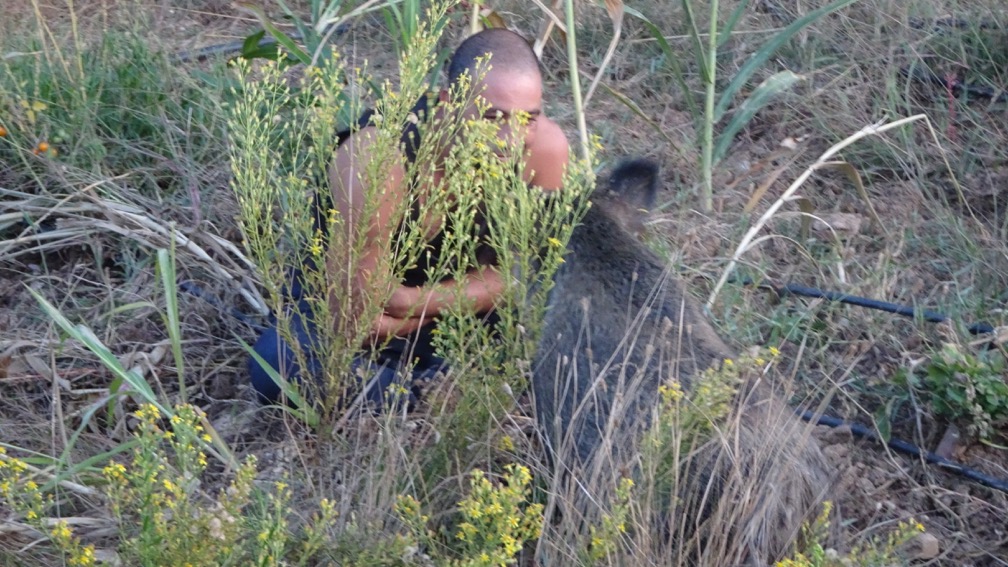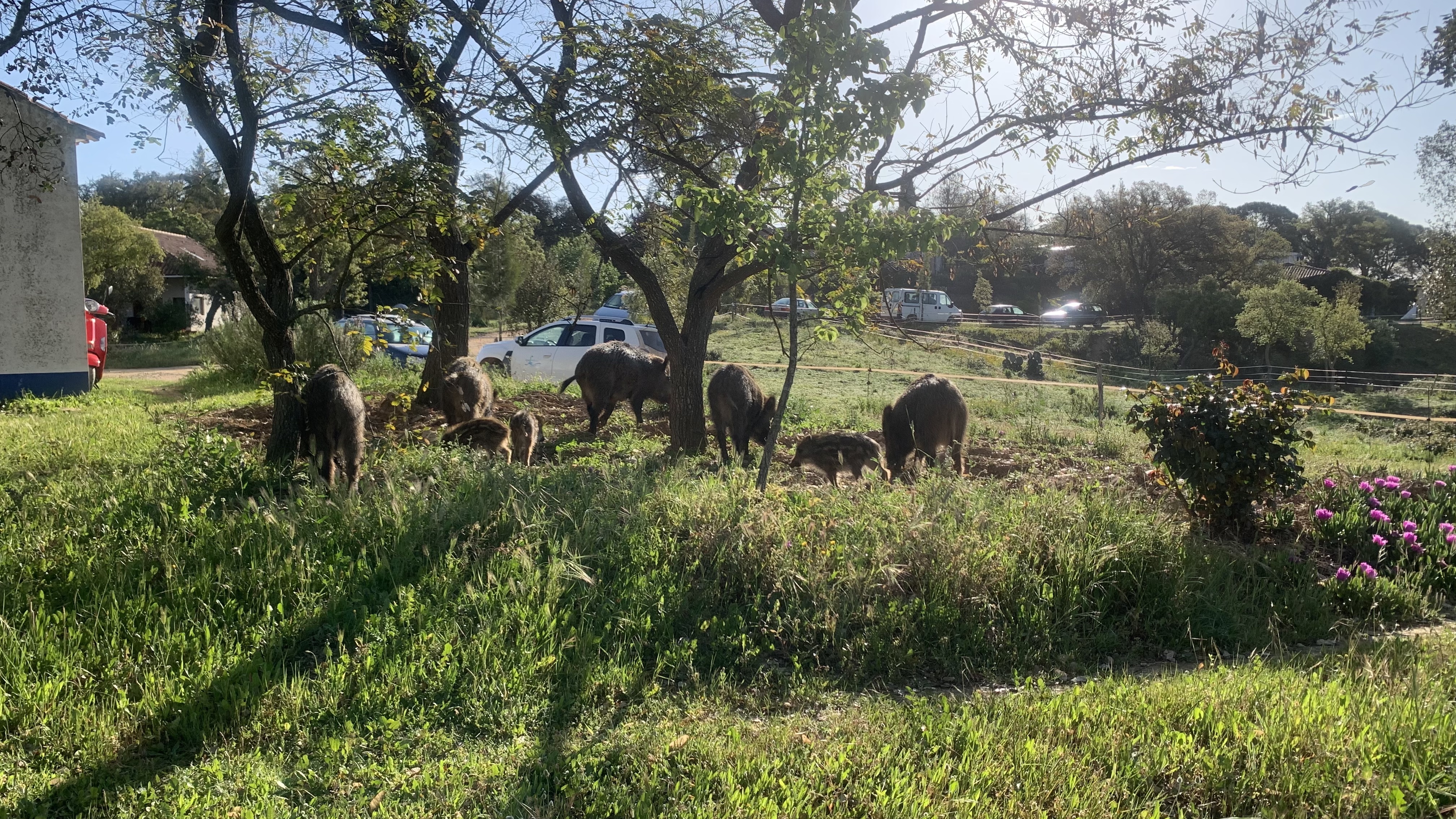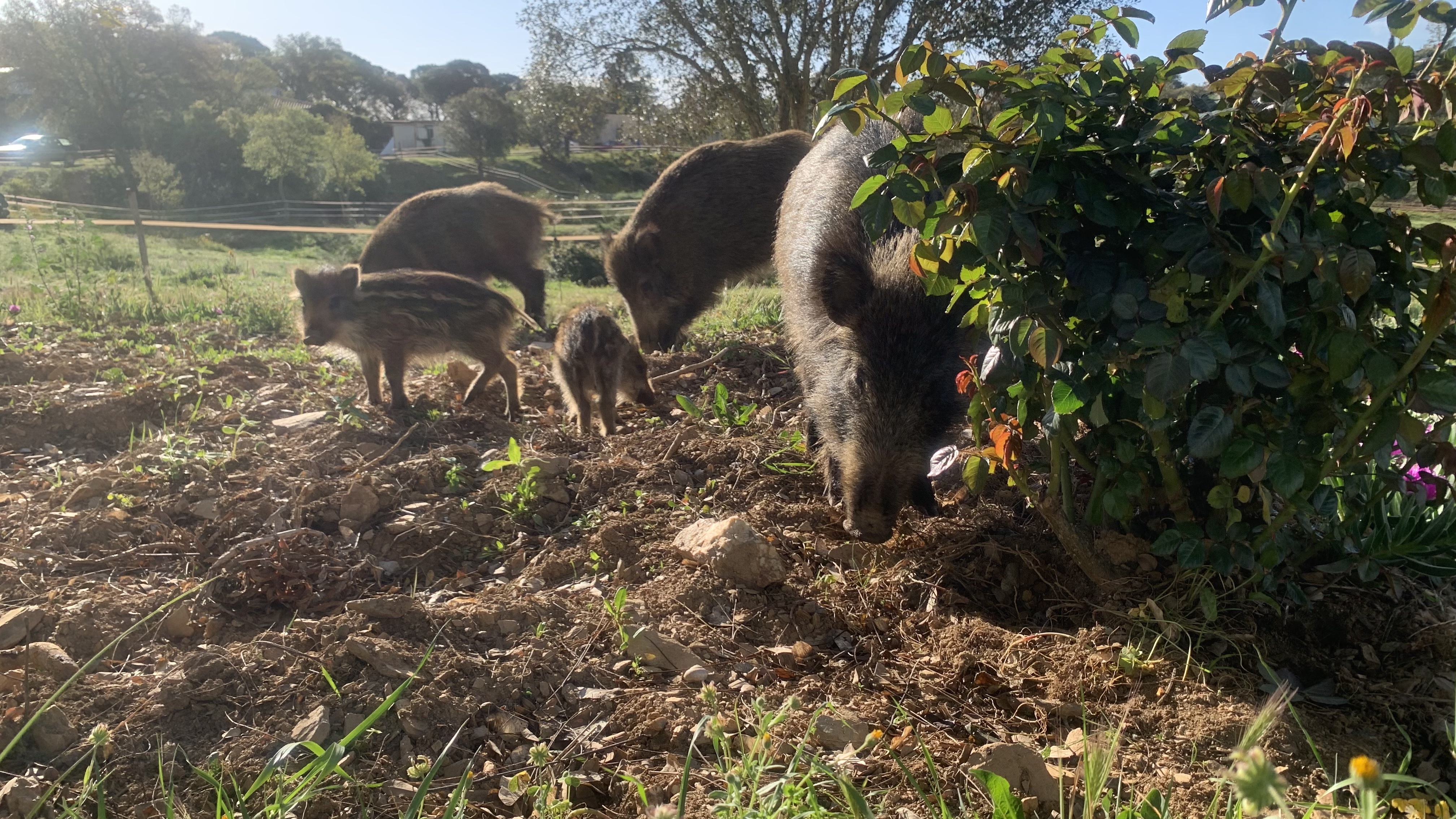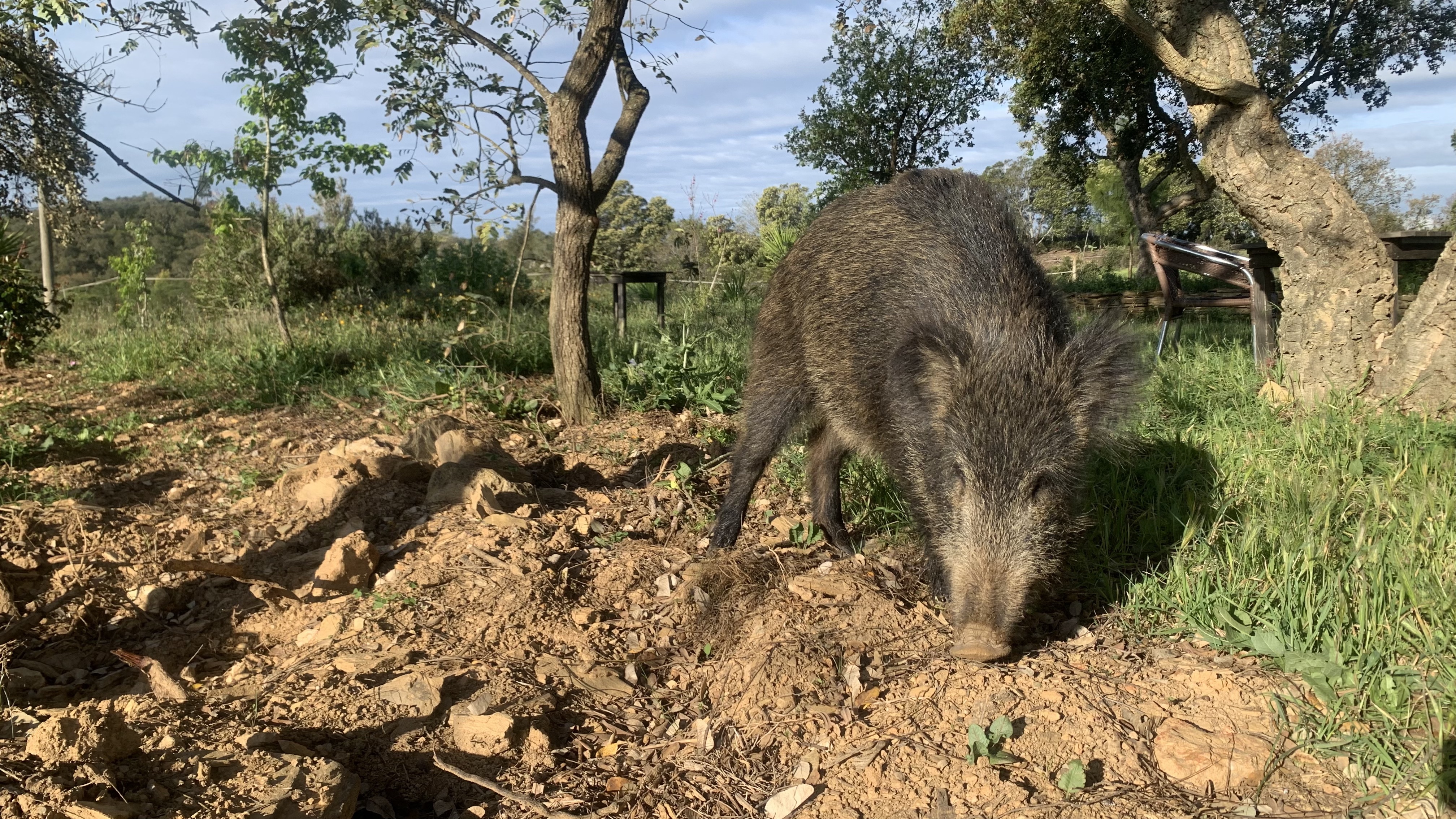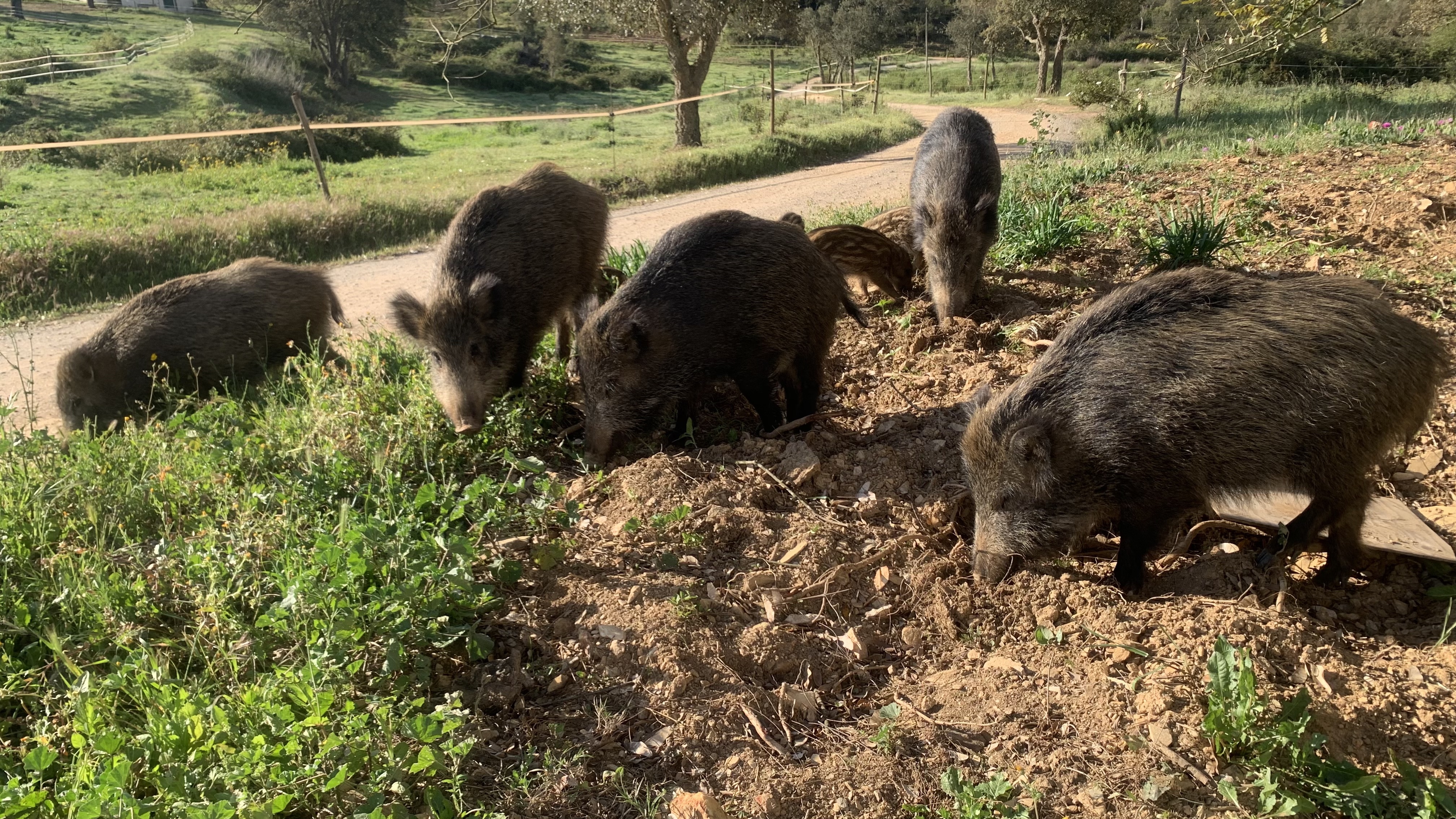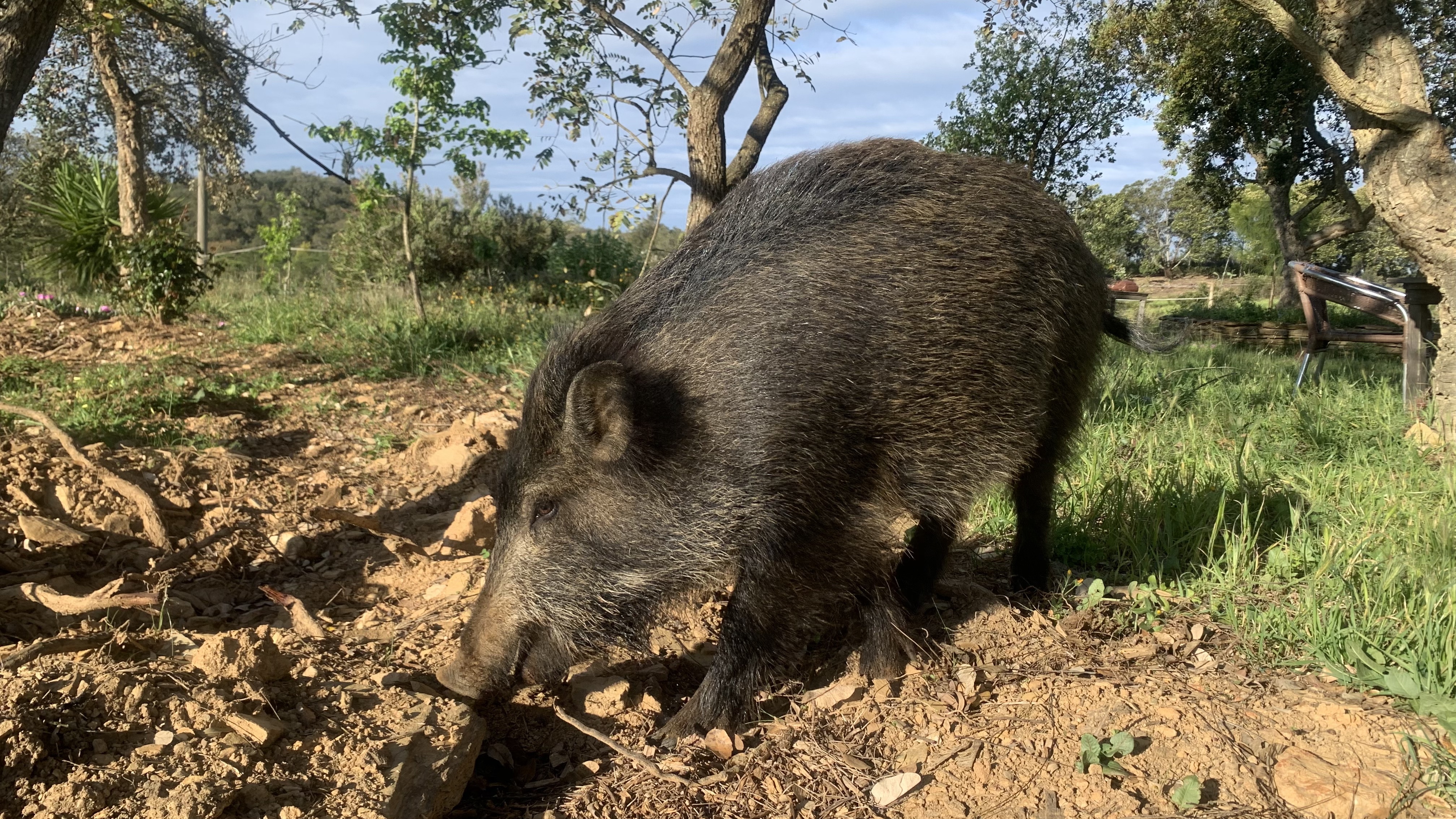Wild Boar Research
Since 2011, wild boars have increasingly started appearing in Tamera, looking for protection from the hunters in the surrounding area. Here they found a hunting-free zone that is abundant in water and food. Since then we’ve been researching the possibility of communication with these beings. Our spiritual research with the wild boar is part of Terra Deva – the department for spiritual ecology, mentored by co-founder Sabine Lichtenfels. Today, Heike Kessler, Katja Mueller, and others in collaboration with the ecology department are continuing this work. It has included creating places for mutual perception and communication inspired by the work of Eike Braunroth.
Vision
When the wild boar first appeared on our land and started to destroy parts of our gardens, we faced the question of how to protect our harvest in a nonviolent way. Should we use electric fences? Poison? We were internally confronted with the fear of these beings – a habit of fearing wild animals which most modern humans have. At the same time, we realized the impact of this widespread reaction on the animals: wild boar are poisoned, separated from sources of food and water and hunted as part of the meat industry. Knowing this, we decided to walk a different path. Inspired by Eike Braunroth’s experience, and our previous work in relation to other animals and plants, as part of the vision of a Healing Biotope, we started our research.
The first step toward trustful cooperation was to develop curiosity towards our “cooperation partner,” in this case, the wild boar. By doing the inner transformational work connected with the anger that comes up when gardens are seemingly destroyed by their behavior, throughout time, our connection changed: from fear and anger to curiosity toward them. We formed the following agreement between us as a community and the wild boars:
“We appreciate you being with us, we will take care that you are safe on our land and we will inform you if there is any change on the land that might affect you. We will also stay in contact through meditation and prayer in places dedicated to our contact and make sure that the land is rich with food and water for you.”
This agreement was written and placed in the chosen field that served us for research. (To be clear, we’re not suggesting that the wild boars can actually read – writing letters is one way, among many, to focus our consciousness on the information we want to give and then to stay open to the messages we receive.)
Research
Our research has focused on the following questions:
- How will humans and wild boars want to live together once humans are no longer driven by fear, or by the habit of excluding other beings from our way of life? How will the relationship change when humans get to know the beauty of the wild boars’ spirit as well as the ecological roles they play?
- How can we communicate effectively and set boundaries without using force?
- Is it possible to kill wild boars for their meat in a way that’s conscious, based on their consent and aligned with values of nonviolence, as is still practiced by some Indigenous cultures?
- Will the wild boar population grow disproportionately to available resources if they are not hunted? Or can the population self-regulate?
- How can we live closely with these wild beings without domesticating them?
- How can we develop and build our community facilities in consideration of the wildlife around us?
- What can we as humans learn from the being of the wild boar? And what can we learn from them about rediscovering our own wild nature?
Research approaches
- When wild boars appear or dig up the land in a certain place, we ask ourselves: why did they visit there? We try to understand the synchronicity of the wild boar’s actions with the issues we are working on within our social context and make changes accordingly. Often wild boar will remove plants that are not flourishing anyway, or dig the land in places where we have watered too much. We feel that through their actions they give us orientation as to how to tend the land. We stay updated on the situation of the wild boar in the world and listen to the synchronicity of their actions on this level as well.
- Every half a year we review our cooperation agreement with the wild boar. Our research group goes to the prayer place on our land which is dedicated to the wild boars and gives an offering like singing a song or giving flowers or healing plants as a sign of gratitude and our commitment to the agreement we hold with them.
- Writing letters: we use letters to outline the specific forms of cooperation we are asking for, as well as specific support for our prayers and actions (for example, we might ask them to dig in certain places, to not destroy young trees, or we might offer them 30% of the harvest and ask them to leave the rest for us). In Tamera, we are a hunting-free zone but all around us the wild boars are being hunted, so it’s important for us to have contact with the hunters around us. Our aim is to develop a mutual understanding, knowing that hunting is part of the culture in this area, and for the hunters to know about our research and attempt to have nonviolent contact with the wild boars. It is also important for us to know when there will be hunts close by so we can be prepared to support any injured wild boars coming to our land for refuge.
Key Learnings
In our research, we’ve found that:
- Wild boar populations adjust to their habitat and find a natural balance when they have a safe place to be in and are no longer hunted and feared.
- We see the wild boars as land stewards – they often come to places where tending is needed.
- We learn from the wild boars about the untamable vitality of life and the wild nature of our own being. They embody power, courage, and fertility.
- On a spiritual level, we feel that wild boars stand for healing topics we often want to avoid or suppress. They appear as a helping force for individuals or groups – often encouraging deepening in one’s own life topics. From our experience, once we started to work at the relevant depth, on both the inner and outer levels, the wild boars stopped causing damage and began a balanced co-existence with us.
- By doing inner work in relation to the wild boar, we can understand how far we’ve distanced ourselves from our own wild nature. We can perceive how numb we are to the suffering of our fellow beings and see our own alienation from the family of life. When we start to understand how systemic oppression works and start to bear witness to the pain it causes, we are changed by it, and this inner point of change enables us to act truthfully and authentically towards a culture that puts life at the center.
We believe our research with wild boars can serve as a lived example for how we can collaborate with all forms of wildlife that surround us. This work is a constant reminder that all life is interconnected and every action we take influences our fellow living beings. We are grateful to have the wild boar with us, and for the possibility to discover, with their help, new pictures of living together with nature in mutual support and peace.
Courses and Resources
If you want to delve deeper into this topic, enroll in our online course:
Some resources we were inspired by:
- “Cooperation with Wild Boars in Palestine” by Saad Dagher
- Lesser Beasts by Mark Essig


